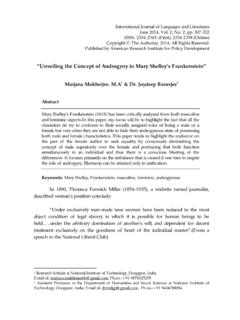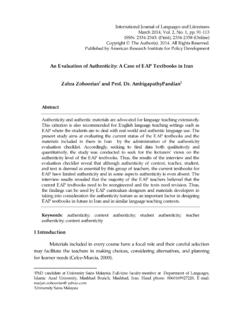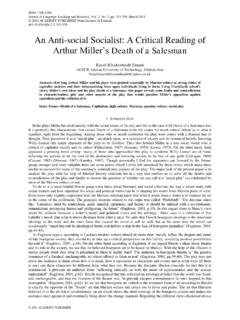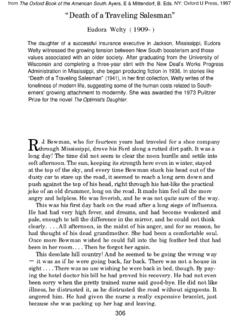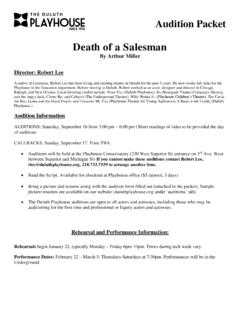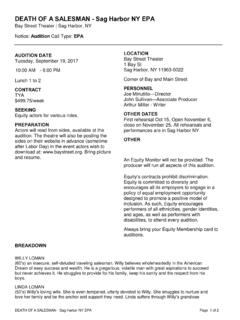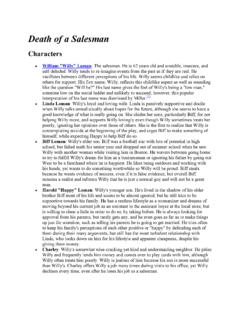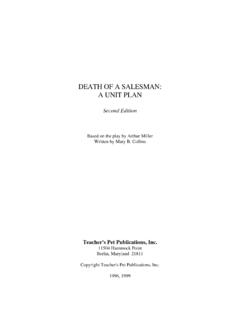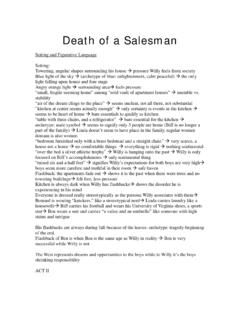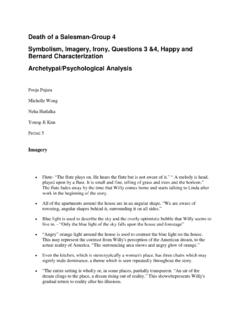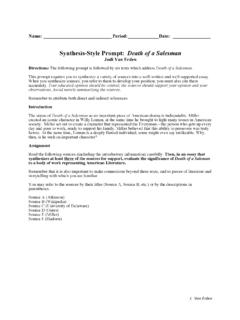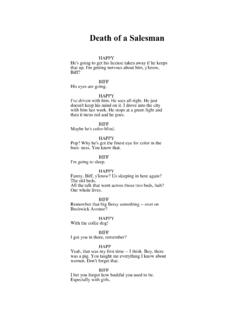Transcription of Death of a Salesman: Critique of the American Dream
1 International Journal of Language and Literature June 2017, Vol. 5, No. 1, pp. 69-71 ISSN: 2334-234X (Print), 2334-2358 (Online) Copyright The Author(s). All Rights Reserved. Published by American Research Institute for Policy Development DOI: URL: Death of a salesman : Critique of the American Dream Majid Salem Mgamis1 Abstract The paper examines Arthur Miller's masterpiece, " Death of A salesman ", highlighting the Critique of the American Dream as represented in the play. The paper does not dwell on common critiques of this theme in the play; rather it focuses on the excessive inclination towards individualism and greed as represented in the major character in the play; Willy Loman. Willy is taken by his dreams of success and happiness so much so that he ignores the social realities he lives in.
2 He ignores all societal parameters pertaining to his life and focuses on his own version of the path to success. That is why he is rejected by his community, including family members. Through the character of Loman, Miller criticizes the way some Americans take their "dreams" so far, to the point that this Dream turns out into a nightmare, even a tragedy, as reflected in the ending of the play. Keywords : American Dream , Individualism in American Drama Traces of The American Dream are rooted in 19th-century America. However, it was the historian James Truslow Adams who first coined the term in his The Epic of America (1931, p. 16). He defined the American Dream as the pursuit "of a better, richer, and happier life for all our citizens of every rank which is the greatest contribution we have as yet made to the thought and welfare of the world" (20).
3 This vision evinced from the values demonstrated in Thomas Jefferson s (1776) The Declaration of Independence which highlighted people s right to "life, liberty and the pursuit of happiness"( Pr. 1). So Americans were looking for renewing their lives and establishing a better future. Although they were positive in nature, these interests were not without negative impact on the lives of people. It lead to extreme focus on materialism, perfection and fantasy on the expense of humanitarian and realistic values . Arthur Miller s Death of A salesman provides a vivid commentary on the American Dream . In the play, Miller criticizes the American materialism, and the self-delusion that people were afflicted with. His Critique is not directed at the American Dream as such; rather it targets the greed that some people show in demonstrating their dreams for wealth and health.
4 This is essentially provided through the character of Willy Loman, whose failure was mainly because of his illusion and pursuit of perfection. Death of A salesman narrates the story of Willy Loman, a salesman who, as a common man, has his dreams for prosperity and wealth. However, in having his own deluded version of the American Dream , Willy fails to cope with the changes in the business atmosphere after World War Two. Rather than coping with these changes, Loman sticks to traditional models represented in his father, who presents the ideals of tradition business. In this sense, Willy tries to apply the principles that his father holds to a modern environment that no longer believes in these principles. Prior to the time of Death of A salesman , The American society was characterized by a strong sense of individualism.
5 As Jim Cullen (2003) argues, the American society celebrated people who, with nothing but pluck and ingenuity, created financial empires that towered over the national imagination (60). However, by the time the play was published, and the in the wake of the industrial progress that was witnessed, America was witnessing a radical shift in social and economic values. There was a considerable level of shift from individualism to social conformity. However, some groups, who lived in the frontier, clung to the old model, stressing the values of individualism on the expense on conformity. 1 English Department, Tafila Technical University, Box 179 Tafila , 66110 Jordan, Email : 70 International Journal of Language and Literature, Vol.
6 5(1), June 2017 As William Whyte (1951) explained, some Americans continued to affirm the old faith as if nothing had really changed at all (5). Willy Loman is an example on these people who were so orthodox in their view. He is unable to live his day. He lives in the past. He has succeeded in his business in the past; however, in the current time, he is unable to meet the parameters of success. He admits this conflict that he witnesses as he addresses his wife, Linda, saying: You know, the trouble is, Linda, people don t seem to take to don t know the reason for it, but they just pass me by (Act-I. 732-733). The major problem that Willy seems to suffer from and makes him out of context in his life is his adherence to the idea that one can succeed in business by imposing his personal perspective without heeding other concerns.
7 He puts this clearly as he says: The man who makes an appearance in the business world, the man who creates personal interest, is the man who gets ahead (Act -I. 646-8). This idea represents his traditionalism and taking his father as a model for him. In this regard, Ben tells Willy how their father used to sell the homemade flutes all over the country as a travelling salesman . He complains that: We would start in Boston, and he d toss the whole family into the wagon, and then drive the team right across the country (Act-I. 1061-3). In other words, Willy still clings to the model of the traditional frontier salesman whose idea of success relied on leaving the house for a long time and coming back with a large amount of money riding on a smile and a shoeshine ( Requiem 38).
8 Interestingly enough, Miller employs some symbols that contribute to conveying the message of the play. For example, the car is used as a symbol for familial solidarity. That is why, once he sees his misery, Willy starts to perceive that he is losing control over both his car and life. That is why, in an act of unconscious self defense, Willy chooses to commit suicide by the car. It is as if he is trying to prove to himself that his life would end with a last act of control; control over his car. Ironically, realizing the failure of his father, Biff considers all Willy s teachings as lies. He proclaims, we never told the truth for ten minutes in this house (Act-II. 1588-9). However, Willy is does not have the potential to confront the dilemma.
9 So, he has no solution but to commit suicide. Steven Centola (1993) reprimands Willy's acts arguing that he "convinces himself that only his Death can restore his prominence in his family s eyes and retrieve for him his lost sense of honor (41). This concords with Fred Ribkoff's (2000) idea in which he states that, Driven by shame, (Willy) kills himself in order to preserve his Dream of being well liked and a successful father and salesman (48). In the same vein, Louis Stagg (1994) dwells on the cowardice of Willy exhibited in his suicide, arguing that Willy appears to see Death as a means of avoiding the consequences of actions with which he can no longer cope (53). The crux of Miller's point regarding the American Dream is that success and prosperity are better attained by facing the challenging situations of the reality of American life rather than romanticizing on fanciful dreams.
10 In this regard, the play provides two models for success that contrast with the example of Willy; they are namely Ben and Charlie s. What is peculiar about Ben is that his personality combines elements of the past values as well as manifestations of modern tendency. This makes Ben quite capable of success within the industrial environment. Ben s understanding of the futility of rejecting modern requirements of life is reflected in his advice to Biff as he says: Never fight fair with a stranger, boy. You ll never get out of the jungle that way (Act- 1. 1085- 6). In contrast, Willy is never able to understand this point. He sticks to the belief in strict individualism and quick success. Charlie, on the other hand, is the symbol of reason and logic. He keeps advising Willy for the benefit of his children, but, again and again, Willy is so stubborn.
